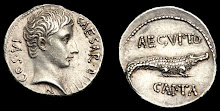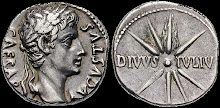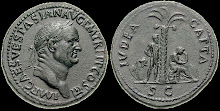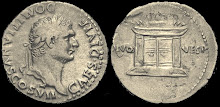The Evangelion was originally written as an allegorical polemic against the religious and political rebellion of the provincial Iudaeans through the reigns of the Flavii; Vespasianus, Titus, and Domitianus. Those knowledgeable in the sacred writings of the Iudaeans understood the symbolic nature of this so-called “good news”. Amongst the slaves and legions however, a worship of the central Christos figure, Iesous, began to emerge among the ignorant who took the story for truth. The Flavian faction used this new opportunity to institute a syncretic Romeo-Iudaean Imperial Cult with the Divine Flavii identified with the Father and Son figures.
Vespasianus was born to the Equestrian class and had along with his elder brother Sabinus been granted the Senatorial toga. Vespasianus had successful military victory early in his career in the Roman invasion of Britannia, allowing Claudius to celebrate a triumph at which he was bestowed triumphal honours. After his post of Military Tribune, Vespasianus continued with other offices of the Cursus Honorum, Aedile and Praetor. Vespasianus attained the rank of Consul for the last two months of 51. Vespasianus after 11 years of retirement was granted a governorship of Africa province in which he was held to have been a fair ruler. Later becoming a favourite in Nero’s court, then falling out of favour for falling asleep during a public performance on Nero’s tour of Graece in 67.
Vespasianus’ eldest son Titus accompanied his father to Iudaea and was granted a command, while his younger son Domitianus remained in Rome under the charge of Vespasianus’ brother Sabinus, Prefect of the City Guard.
Upon the fall of Nero, the senate granted Servius Galba to the Imperium following a successful military coup by Gaius Iulius Vindex, while in command of the legions of Spain. Titus was sent immediately from Iudaea by Vespasianus with greetings to Galba, though some suggest that the true motive was to have Titus petition to be adopted as Caesar by the childless and elderly Augustus. That honour however, eventually fell to Licinianus Piso who was cut down in the streets of Rome by rebels of Salvius Otho along with Galba four days later. Not long after, it was learned by Otho that the German legions of Aulus Vitellius had revolted and were marching on Rome.
Titus learned of the civil wars now known as the year of four emperors, while en-route to Rome with King Iulius Agrippa of the line of Herodes the Great, in Cyprus. Titus, a devoted pagan had been visiting the Temple of Aphrodite to make sacrifices to the oracle to cast auguries. The priest sought out Titus in private that the omens declared favourably to his obtaining the empire. There, he also learned of the history of the temple. Prior to the Hellenistic rule of Cyprus a rough natural obelisk had been dedicated to the worship of the Phoenician goddess Astarte. The temple was later converted to Aphrodite and the rock was said to be the birth place of the goddess.
Titus decided to return to his father in Iudaea rather than continue with greetings for a dead man. It was decided that Agrippa would proceed to Rome, while Tiuts hurried back to Agrippa's sister, Berenice, with whom Titus had been having an affair with. During his return voyage Titus passed through Antioch and met with Syrian governor Licinius Mucianus. Mucianus had become involved in the Iudaean rebellion after the province first fell. His failure to crush the revolt with his legions resulted in Vespasianus’ appointment and Mucianus previously had strained relations with the Flavian General. Titus, however, cemented an alliance with Mucianus in support of his father. Both journeyed to Iudaea to hold council with Vespasianus.
The revolt of the Eastern legions was urged upon Vespasianus by Mucianus. But the war in Iudaea was still very much a concern.
Mucianus preferred to gain influence and wealth through his assistance and leave the burden of rule to another. Berenice also acted as Messenger between Titus and Tiberius Julius Alexander, prefect of Egypt, through Basilides the high priest of the god Serapis. Alexander was the son of Alexander the Alabarch of Egypt, a high tax collector who was the brother of Judeo-Stoic philosopher, Philo of Alexandria. The younger Alexander, had also been procurator of Judea for a few short years previous to his promotion to Egypt, not much good however, was said of that governorship. He executed the sons of the Jewish messianic rebel leader Simon the Zealot, who had claimed the rule of Judea for a short period.
Alexander had forsaken his Jewish heritage and taken the Roman name of Tiberius Julius from his father who had received his roman citizenship from Tiberius. This was most probably met with disfavour by Alexander’s family which had included Philo, a national defender of the Jewish faith, who had led a deputation to Gaius Caligula in 40 CE in defence of the Jews of Alexandria against the Greeks during racial rioting in response to the insistence of Caligula implementing the establishment of the worship of the Roman emperors as gods throughout the empire.
Vespasianus went to Egypt to cement the alliance with Alexander meeting at the temple of Serapis with Basilides and Alexander. There Vespasian also sacrificed many victims and was assured of his gaining the empire. Alexander controlled three legions and the bulk of the grain supply to Rome. On the first of July, in 69 Alexander had his soldiers salute Vespasianus as Emperor. They also held a public demonstration in Alexandria where Vespasianus healed two commoners who were prompted by Serapis. Vespasianus healed a blind man by spitting in his eye, and healed a deformity of the hand by stepping on it. It was declared miraculous by the superstitious Egyptian commoners, who had been worshiping their pharaohs as gods for thousands of years, and believed it to be a great portent of Vespasianus’ divine status as emperor of Rome.
Titus meanwhile was waging war on the Jews in Jerusalem. During the early campaign the Romans had captured the rebel leader Yoseph ben Matthias. Iosephus had been taken to Titus and Vespasianus. Iosephus was interviewed about the causes of the war, Iosephus explained that there were prophecies which spoke of a great leader arising from Iudaean destined rule the world, in the holy books of the Jews. The Iudaean peoples believed that the rebel leaders were the Christos’ that the texts spoke of, but in fact this prophecy was meant for Vespasian himself and his destiny to become Imperator. He met with his advisors which included Mucianus, Agrippa, Gaius Julius Antiochus IV Epiphanes, King of Commogene, and through correspondence, Domitianus and Sabinus in Rome, and Basilides and Alexander in Egypt.
A strategy was devised in which Alexander provided a Greek manuscript of an unpublished work of Philo detailing an account of a Jewish messiah as depicted in scripture. This work included the sayings of the messiah. Mucianus, who was fluent in Greek, authored an untitled work. The messiah is depicted with veiled references to the Iudaean campaign. Iesous is in fact Titus himself, and the father is Vespasianus. The Jews had revolted against the worship of the Emperors as gods. Disguised as such, they believed that the barbarous Iudaean commons would believe that the messiah had come and the prophecies were fulfilled, worshipping their overlords under false names. The mass production and distribution of the book we now know as the gospel of Mark, was not a success, causing the renewed rebellion of the Jews. However after the destruction of the temple in Jerusalem and conquest of Iudaea, a following of Iesous Christos amongst the slaves and soldiers had developed as the gospel was authored in Greek, a common tongue in the late first century Greco-Roman world.
Upon the ascension of Vespasianus a special series of games were held in which the great poets of the empire competed. The victors receiving annual salaries from the public funds. The Flavii utilized these state sponsored authors to further refine the Evangelion to remove some of the geographical and cultural errors and to style the writing in a local Iudaean flavour.
They captured Iosephus during the conflict and commissioned his writing of the history of the war and his peoples.
The Flavian faction supported the use of Christianity on the slaves and subject foreigners just as the descendants of Caesar had supported the construction of temples to honour the emperors as gods in the provinces. Worship of the approved state religions for citizens was a matter of law. Indeed many were slain under the charge of atheism, under which term included practicing Judaism.
Alexander and Basilides reworked the Iesous story to attempt to correct the errors that the attempt of Mucianus had been known by the Jews to contain. It provided for a text that had more Alexandrian Jewish contemporary style, although the men who wrote it were not practicing Jews themselves. This attempt was not made to target the Jews but to resist opposition of the gentiles who accepted the text as authentic. It provided the back story complete with a family genealogy to David, but on his adoptive father’s side because Iesous had also been born of a virgin, conceived by God.
The story of the nativity has elements derived from many mystic religions popular in the day . The temple at Memphis has a wall mural depicting many elements of the basic story. The popular worship of the cult of Mithras in the East is also a source where much of the mythological elements of the Evangelion are drawn.
As the members of the original conspiracy including Vespasianus began to age and die, sometimes under suspect circumstances the younger Flavii took control of the task. Titus is given the final published manuscript of Bellum Iudaiacum. Elements are drawn from Iosephus by the state authors to produce a third revision of the Evangelion and a continuation of the acts of the early church.
Titus, after the fall of Pompeii suddenly died under suspicious circumstance, with Domitianus being present. Domitianus went full vigour commissioning the writing of the final Evangelion, at the same time commissioning the construction of temples, even in the Forum, to the Divine Vespasianus and Titus.
Domitianus went on to rule for thirteen years as Imperator before being assassinated by a conspiracy which involved his wife Domitia Longina,
Wednesday, May 19, 2010
Subscribe to:
Post Comments (Atom)







No comments:
Post a Comment